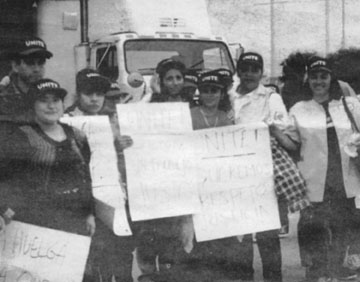NY laundry workers score
gains in contract
Long Island workers win raise, benefits
following strike for union
(lead article)

Workers at laundry in Oceanside, New York, picket during October
strike that forced company to recognize UNITE. "We want respect and
dignity," reads one sign in Spanish.
|
BY JORGE LERTORA
AND OLGA RODRÍGUEZ
OCEANSIDE, New York--"The company feels the presence of the union now," said Francisco Zapata, a shop steward at the newly organized Oceanside Institutional Industries, a large industrial laundry in this Long Island town. In a phone interview, Zapata was commenting on the victory won by workers at this large industrial laundry on Long Island in gaining a union contract and pushing back abusive conduct by the bosses.
Speaking to Militant reporters at the plant gate a few days after a tentative contract was reached, Mauricio González, 19, said, "This is our first contract ever. In the three years I have worked here, I never had medical insurance. Now we will all have insurance as well as a wage increase." Another worker, Beto, said that while he didn't know of all the provisions in the agreement, he was glad they now had a union, and saw the contract as a gain.
The 250 workers at Oceanside struck for three days in mid-October and won recognition of their union, the Union of Needletrades, Industrial and Textile Employees (UNITE). They then immediately joined workers at 35 unionized laundries in the New York metropolitan area in fighting for a contract.
UNITE negotiated through its regional structure, the Manhattan-based Amalgamated Services Allied Industries Joint Board. On November 28 the workers at these industrial laundries won a tentative contract settlement containing a number of gains.
Under the three-year pact, some 4,000 workers in commercial laundries that service hospitals, restaurants, and hotels in New York and New Jersey will receive raises of 75 cents an hour the first year, 45 cents the second year, and 40 cents the third year, said Claudia Preparata, of UNITE's research department, in a December 5 phone interview.
For workers at the Oceanside plant, this amounts to a 31 percent wage increase over the three-year term, from their previous starting wage of $5.15. They also won medical and pension benefits for the first time.
Overall, laundry workers in the region reportedly won a 20 percent wage increase plus improved medical benefits and pension plans.
Quoted in the November 29 issue of Hoy, a Spanish-language New York daily, UNITE spokesperson Katie Shaller stated that on retiring, a worker with 30 years on the job will receive a pension of $600 a month.
Workers win language rights
Shaller also pointed to what is called "Model Immigrant Rights Language" in the new contract. She reported that "when the companies issue communications to the workers, they must make them in the predominant language of the workers" in the plant. Most of the laundry workers covered by the contract are Spanish-speaking immigrants. At Oceanside, the majority are originally from El Salvador.
Under the new contract, Hoy reports, workers will be allowed to take time to resolve immigration matters, including a leave to return to their countries of origin for up to 60 days without losing their job or their seniority.
Workers would also be allowed a certain amount of time off work to go to immigration offices when they need to.
Preparata reported that workers ratified the contract in voting organized in each of the laundries over a three-day period.
From the beginning of negotiations, the laundry bosses resisted the workers' demands for a wage increase. According to the November 29 New York Times, the companies' chief negotiator said that labor costs would go up by at least 30 percent because of the wage increases and what he called "substantial improvements in health and pension benefits." Attorney Stanley Israel, who negotiated the package for 15 large laundries, told the Times that the pact was "by far and away the most costly contract that's ever been negotiated in New York in this industry." Laundry workers are among the lowest-paid unionized workers in New York.
The big-business media picked up on the fact that the laundry workers were ready to go the distance to win their contracts. The New York Times article stated that UNITE "had rallied the laundry workers to authorize a strike, and negotiators for both sides said that the threat of a strike hung over the negotiations when the settlement was reached shortly after 3:00 a.m.," three hours after the deadline. Bruce Raynor, the union's secretary-treasurer, told the Times that 25 laundries had signed the agreement, and that those unionized facilities that didn't sign faced a strike.
At Oceanside Institutional Industries, before the strike there had only been a company "union." Workers fought for real union representation in response to low wages, lack of benefits, and poor conditions. They were tired of being exposed to unsanitary conditions while handling bedsheets and other hospital linen. Workers also protested the insulting behavior of supervisors, who would curse them in English, thinking they didn't understand. The company had recently arbitrarily fired two workers, and their co-workers fought back and got their jobs back.
Workers felt more self-confident by their actions. Mauricio González put it this way: "If we hadn't had a struggle here, we wouldn't have a union and we wouldn't have a contract."
|



